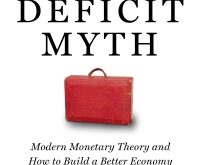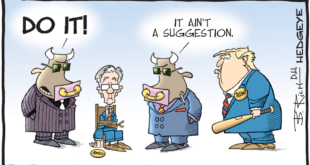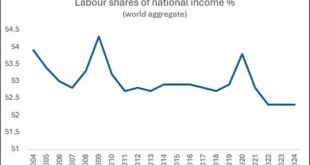from Peter Radford Battle is joined … This might annoy some of you — it is my hasty first thought. The Democrats have been thoroughly defeated. Deservedly so. They no longer relate to, or reflect, the American working class. Without building such a relationship they cannot regain power. Nor should they. Yesterday, early on the morning of election day, a friend of mine forwarded an article by Robert Reich who argued that, in order to defeat Trump, Harris needed to focus more on the...
Read More »MMT — debunking the deficit myth
from Lars Syll We have already shown that deficit spending increases our collective savings. But what happens if Uncle Sam borrows when he runs a deficit? Is that wht eats up savings and forces interest rates higher? The answer is no. The financial crowding-out story asks us to imagine that there’s a fixed supply of savings from which anyone can attempt to borrow … MMT rejects the loanable funds story, which is rooted in the idea that borrowing is limited by access to scarce financial...
Read More »´Fryslan boppe´. An in-depth inspirational analysis of work rewarded with the 2024 Riksbank prize in economic sciences.
Introduction< The 2024 Sveriges Riksbank Prize for Economic Sciences has been awarded to Daron Acemoglu, Simon Johnson and James Robinson for work on the influence of institutions on long-term economic progress and growth. Much has been written about this, for instance by ´Pseudoerasmus´ here and by Radford here. In this article, an ´in-depth´ analysis of a part of the work leading to the the prize, an analysis of the long-term impact of the Dissolution of the English monasteries...
Read More »AJR, Nobel, and prompt engineering
from Peter Radford Well done AJR. A prize deserved. And remarkably little grumbling. What’s wrong with that? In other news, my wife is deep into creating an artificial intelligence application. One of the great challenges of getting AI to be useful is something called ‘prompt engineering’. What have these two snippets of news have in common? The great thing about our better economists — the triumvirate we know affectionately as AJR being an example — is that they all seem to...
Read More »Central bank independence — a convenient illusion
from Lars Syll Today’s model of delegation has much to recommend it. But it should not be cloaked in euphemism. It is an abrogation of democratic sovereignty for pragmatic reasons, conditioned on the one hand by deeply entrenched and unflattering assumptions about electoral politics and, on the other, on an unquestioning acceptance of the private organization of credit markets and their lack of confidence in democratic control of economic policy. This may be an abrogation that we are...
Read More »The 2024 economic laureates and more Nobel nonsense
from Steven Klees I am quite sure that this year’s three Nobel Laureates in economics — Daron Acemoglu, Simon Johnson and James Robinson – are very competent new institutionalist economists. Lars Syll offers a thoughtful critique of their substantive arguments, but he misses the main point for me. New institutional economics, by and large, is nonsense. We used to have many sensible institutional economists who offered a qualitative, sociological-type analysis of the role of economic...
Read More »Pathways to sustainability (2): a critical review
from Maria Alejandra and WEA Pedagogy Blog Jean-Baptiste Fressoz, professor at the School of Advanced Studies in Social Sciences in Paris, challenges our understanding of the current energy transition process. In his book “The Shock of the Anthropocene: The Earth, History, and Us,” co-authored with Christophe Bonneuil, Fressoz offers a critical history of the Anthropocene, the current geological epoch defined by significant human impact on Earth’s geology and ecosystems. The authors...
Read More »Falling shares of labour income
from C. P. Chandrasekhar and Jayati Ghosh The latest World Employment and Social Outlook Report (update for September 2024) from the International Labour Organisation highlights some disturbing trends. Importantly, it identifies a significant decline and then stagnation in the share of labour income in GDP, for the world as a whole, in the past few years. This comes as part of a persistent trend of decline in labour income shares, other than spikes in “crisis years” like 2008-10 and...
Read More »Breaking boundaries in economics: Rediscovering the roots of welfare
from Asad Zaman and WEA Pedagogy Blog 1. The Methodenstreit: How Economics Forgot History In the late 19th century, economics experienced a deep philosophical debate over methodology, known as the Methodenstreit, or Battle of Methodologies. Geoffrey Hodgson, in his book How Economics Forgot History, emphasizes the critical nature of this debate. The essential conflict was between those who believed that historical context and specificity are crucial for understanding economic phenomena,...
Read More »Pathways to sustainability (1)
from Maria Alejandra and WEA Pedagogy Blog Setting the scene Economists and policymakers continue to dominate headlines with the conceptualization of “sustainability,” “sustainable investing,” and “sustainable finance,” along with their various worldwide geographical manifestations. The prevailing scenario, which is characterized by conflict, economic instability, and political disputes, is not favorable to incorporating sustainability into investment decisions. However, pressing...
Read More » Real-World Economics Review
Real-World Economics Review




